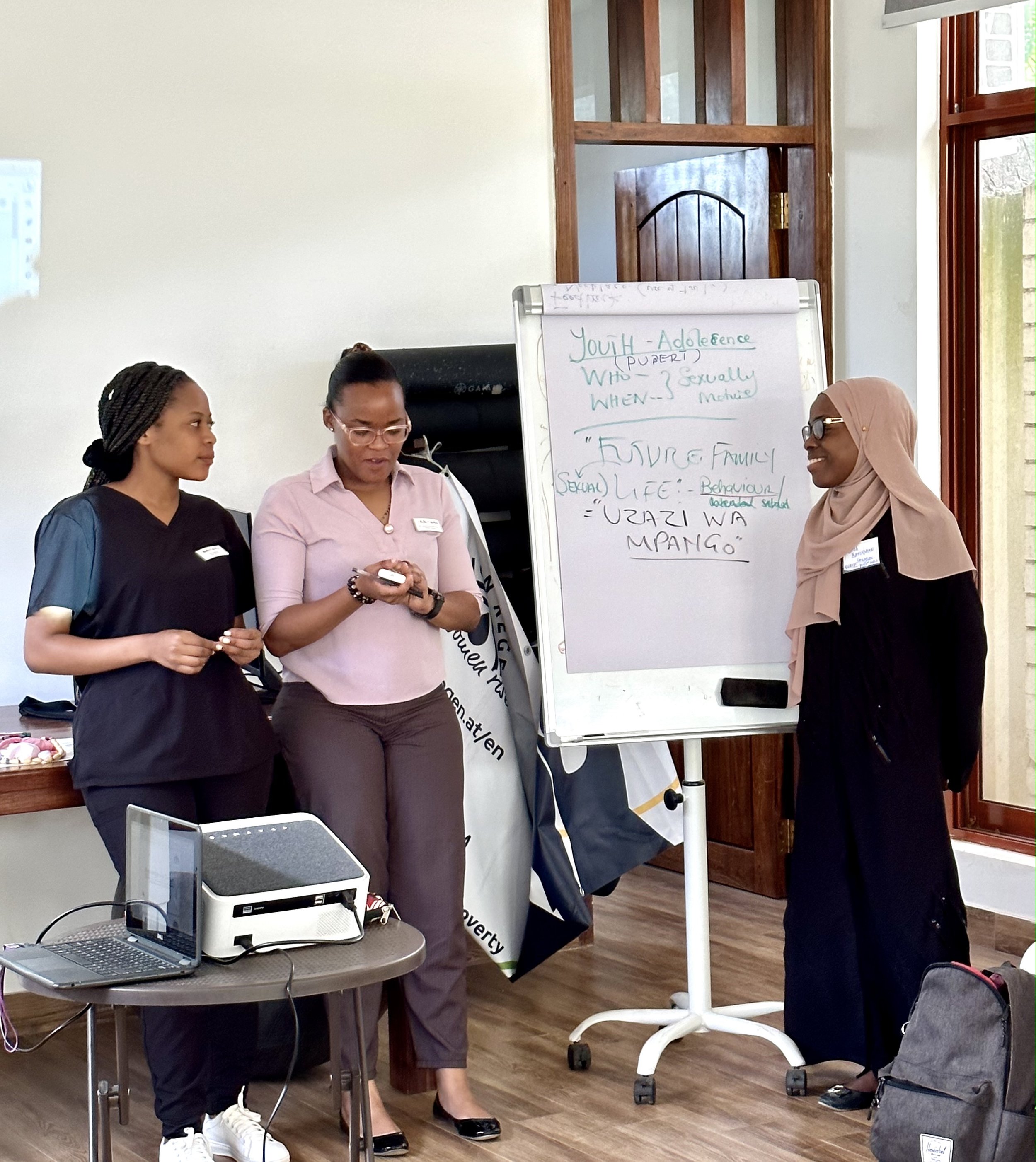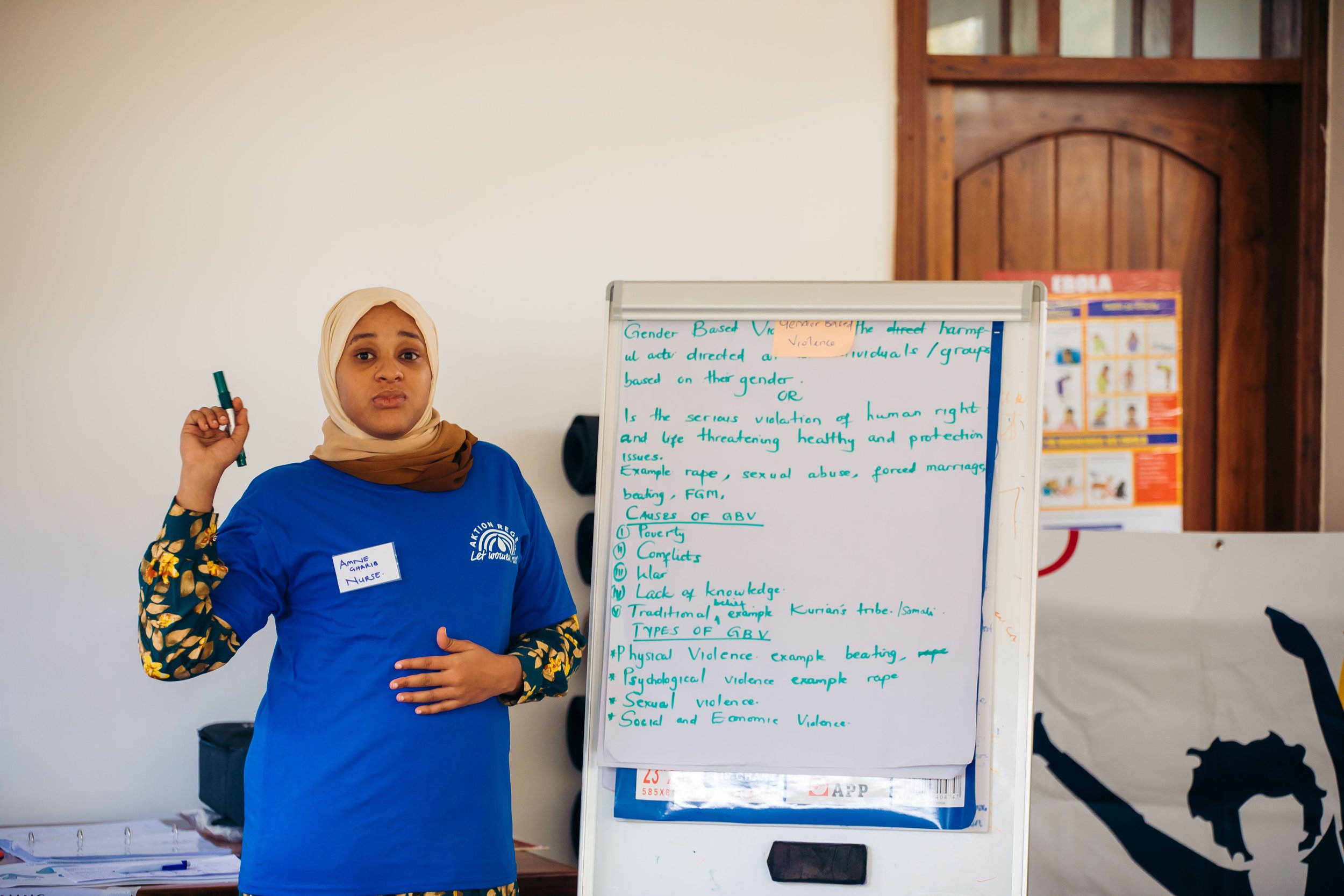Let Women Rise!
In August 2023, at our center in Mbweni, our team participated in a 5-day training course with Aktion Regen (Let Women Rise). The program is aimed to educate and empower women to make informed decisions regarding their sexual and reproductive health. Our training in family planning (FP) & sexual and reproductive health and rights allows us to reach out to Zanzibari communities to pass on this knowledge. Our sessions were led by Mama Margaret and her daughter Monica who were called “Rain Workers”—those who let “knowledge rain” for both women and men, young and old.
From the start of our training, Mama Margaret stressed the importance of uplifting women, especially when it comes to their health. She told us that the uterus is a sacred organ that should be respected by everyone, since it carries the beginning of life. By helping women feel comfortable and in control of their bodies, they are able to make their own decisions and not rely on false information from others. As trainees, we not only learned about reproductive health, but also how to teach these topics to communities in Zanzibar who do not have access to such education. The knowledge we can provide Zanzibari women gives them the chance to speak up and advocate for their health in ways they were not aware of, which has always been our mission at WAJAMAMA.
The teaching kit includes various tangible tools:
The “Why Family Planning?” glove lists on each figure what parents must provide for their child, and are things that must be considered before having one.
The “Clitoris” tool demonstrates the female genitalia, pointing out the clitoris intended for anti-FGM education.
The “Birth Spacing” tool illustrates a healthy timeline for pregnancies to ensure the safety of the mother and child. The “Uterus” tool helps explain pregnancy, contraception, and STD awareness. The “Baby Necklace” tool symbolizes the menstrual cycle.
Lastly, the hand book provides a more in depth analysis on the topics discussed during training.
Trainee Amina holding a baby necklace, consisting of 30 beads to represent the average menstrual cycle. Each color indicates a phase of the cycle—red is menstruation, yellow is infertility, and blue is for fertile days.
(this tool is not intended as a contraceptive method)
Educating women on their bodies and health rights protects their health, while preventing them and their families falling into the poverty trap. Mama Margaret and Monica explained to us why this is: Planned pregnancies/FP reduce negative health outcomes for the mother by ensuring healthy birth spacing, mental and physical well-being. As for the child, it allows them to grow up in a safe environment where all their necessities can be provided, thus reducing the poverty level.
As soon as our second day of training, the trainees eased out of their shyness and were eager to learn more—asking questions that are culturally considered taboo. This included the process of fertilization, the menstrual cycle, sexual and reproductive health rights, HIV/AIDS prevention, contraceptives, and the dangers associated with female genital mutilation (FGM). Mama Margaret and Monica assured us that there should be no self-stigma or stigma on others for learning. In a group of 13 individuals, we were able to freely talk about sex and how to effectively plan for pregnancies. We ended our sessions by practicing how to teach students and those in rural communities about these topics, keeping its cultural climate in mind.
Throughout the week, we participated in different activities to spread awareness on reproductive health. For instance, we passed around raw egg white to represent normal discharge for women, observing its clear/yellowish color and feeling its stretchy texture. We also engaged in group work activities, such as drawing and labeling the female and male reproductive organs. This gave us the chance to use our creativity while learning and communicating with one another. Another activity involved us listing our thoughts on FGM in relation to gender-based violence, which we then shared with the rest of the cohort.
At the end of our training, we were given our teaching kits and celebrated over food and henna. We were all excited to bring these teachings to Zanzibari communities to create safe spaces for others like our own.
With partnerships like these, we are able to spread knowledge to better the health of Zanzibaris, especially for women who often feel neglected when it comes to their health and choices. We thank Mama Margaret and Monica from Aktion Regen for their time with us, and look forward to the future of women’s healthcare and empowerment here in Zanzibar.
Written & published by Lily Suleiman, WAJAMAMA Development Intern










